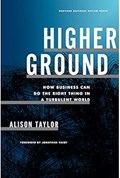BOOK REVIEW
A practical guide to sustainable corporate sourcing and running a scandal-free supply chain
NYU Stern’s Alison Taylor shows how business leaders can take a stance for social and environmental good while maintaining commercial focus
Under pressure to satisfy all stakeholders while also delivering on ESG, companies can fall into box-ticking or virtue-signaling, rather than really making a positive impact for social and environmental good. Often this is understandable. Brave talk of addressing poverty, pollution, and human rights abuse does not easily translate into well-defined actions business leaders should take to do the right thing, while still doing the commercially savvy thing.

In her new book, Higher Ground: How Business Can Do the Right Thing in a Turbulent World, NYU Stern School of Business’s Professor Alison Taylor confronts this dilemma. With several elections pending and ongoing disputes over migration and more, her advice is timely. Too often business leaders feel pressured to take a stand on geo-political and social matters well outside of their area of activity, responding to the loudest agitators on social media, often with unintended bad results and negative PR.
The core argument Taylor makes revolves around trust and credibility. In the developed world the widespread desire to buy from and work for ethical companies committed to societal good has become a powerful force—one that puts business in an unprecedented position of responsibility. Yet CEOs entering ‘culture war’ debates or making statements about climate change can only lead to mistrust and skepticism unless their organizations are absolutely doing no harm in their own operations, and their interventions are clearly relevant and authentic.
Taylor does not suggest doing nothing. Rather she calls for a practical and pragmatic approach and one that is above all strictly coordinated, so that corporate values, ethical positions, and ESG targets are agreed, shared, and most importantly delivered across the organization and its supply chain. And where opinions are sought on external matters they align with these values and are communicated sincerely and within the scope to the organization’s expertise and remit.
Realistic achievable aims should be set, not by what is trending on social media, but by what is directly relevant to the business’s sector and what can have a measurable positive impact. Recent moves by BP to promote its efforts towards Net Zero might appear offensive to some, but—if they can genuinely make a difference—they are at least relevant. Whereas Bud Lite supporting trans rights—which proved to be a disaster—or Nike supporting BLM for purely PR reasons both lacked credibility.
First and foremost, all businesses are about creating and offering a good product or service that people want to buy. Doing this in a clean and ethical way must be prioritized before considering any higher purpose. Unlike the ‘punk’ brewer Brewdog, companies should ensure their own practices towards customers and employees are faultless before grandstanding about environmental and social responsibility.
Taylor acknowledges that in a climate of economic pressure and market volatility, when business leaders are expected to respond to an expanding range of issues, many of which society appears deeply divided about, it is difficult for them to know what to do. It is not surprising many are confused. In this book she offers a guide to facing these contradictory pressures, based on her interviews with many business leaders and illustrated with multiple real-life examples. She emphasizes the need to put things right internally first, then describes how to decide which relevant external issues should be focused on, and what when and how to speak out when necessary.
…………………………………………………………………………………………………………………
A practical guide to sustainable corporate sourcing and running a scandal-free supply chain

